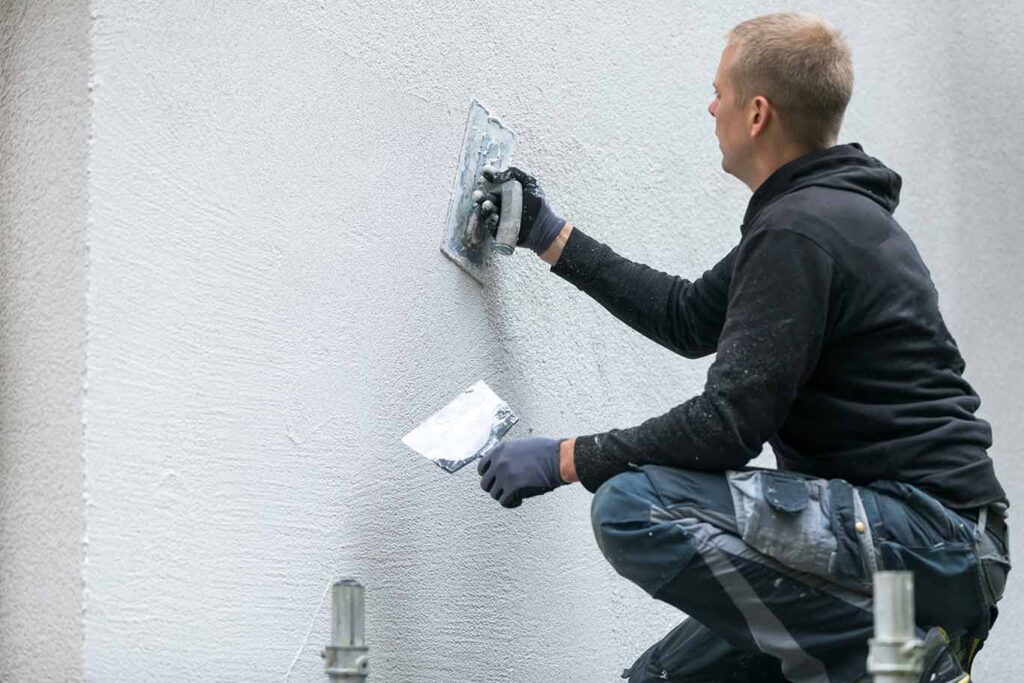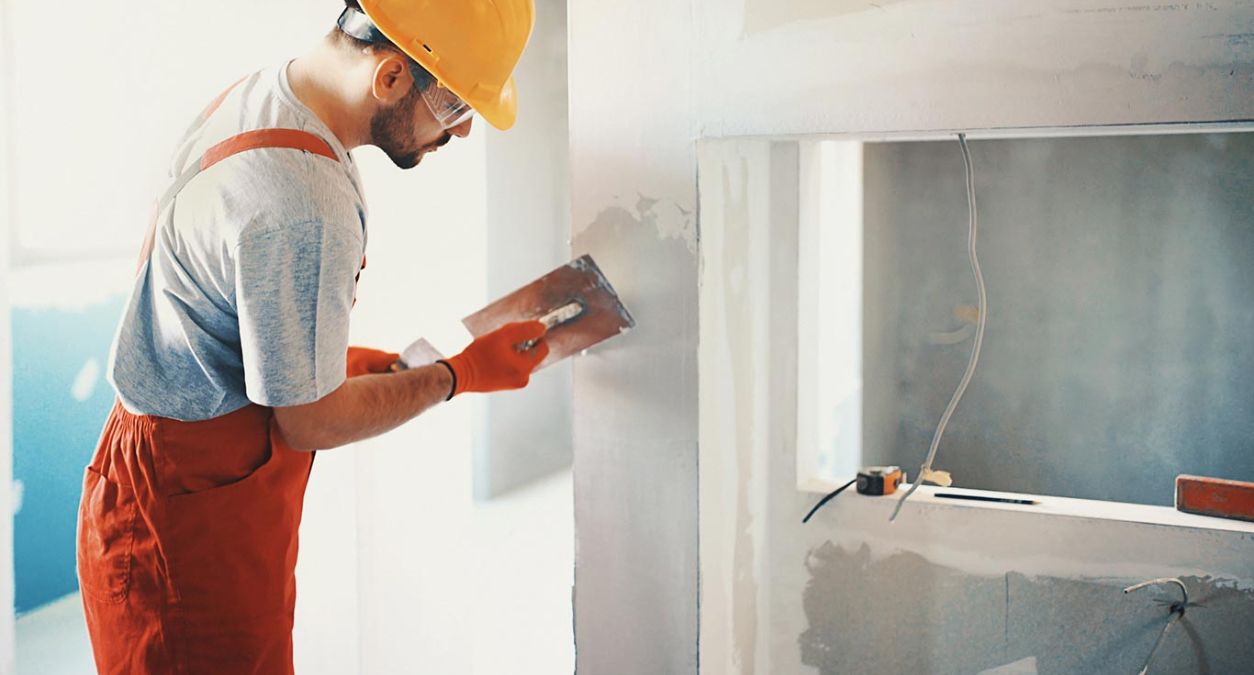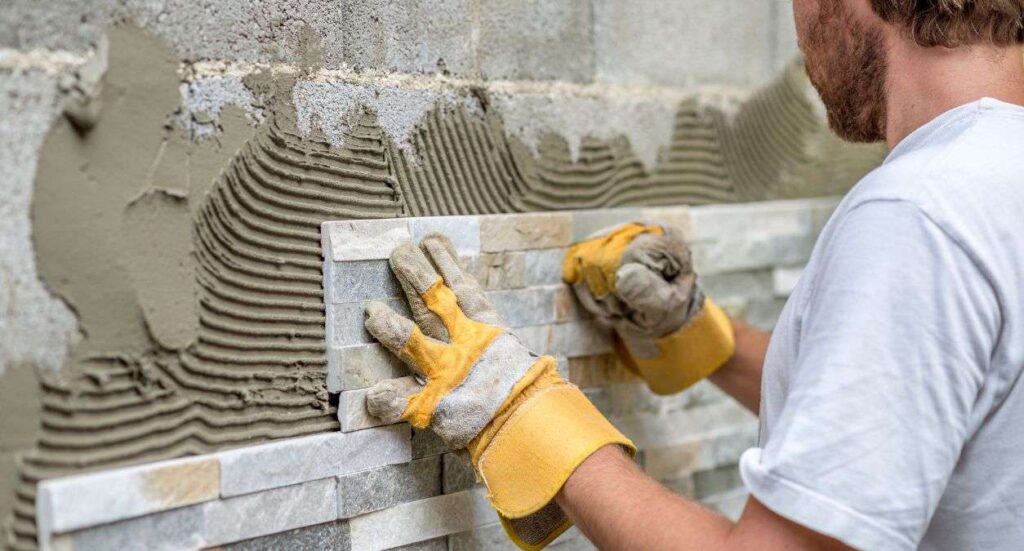Contributors
My main focus is managing the blog and product content for the Protectivity website ensuring everything aligns wi...
If you’re thinking about a career as a plasterer, you’re in the right place. Plastering is a highly skilled trade, and there’s always demand for good plasterers, both in residential homes and on large commercial projects.
You may be wondering how to get start or what you next steps are to become a plaster. What are the best qualifications to do? How much can you earn as a plasterer or whether you should work for a company or go your own way, self-employed?
We’ve summarised everything you need to know about becoming a plasterer here—from the qualifications you’ll need to the kind of work you can expect and how much you might earn.
What plastering qualifications do I need?

You don’t need a university degree to become a plasterer, but you do need the right skills and training to succeed in this physically demanding and detail-oriented job. Luckily, there are a variety of routes to get started.
Formal Qualifications
Most people begin their journey by gaining a Level 1 or Level 2 Diploma in Plastering. These are entry-level qualifications designed to teach you the basics of the trade, including how to prepare surfaces and apply plaster. You can usually find these courses at local colleges or training centres.
Plastering Apprenticeships
Another popular route is to do an apprenticeship. This combines practical, on-the-job training with classroom learning, allowing you to earn while you learn. Apprenticeships are great because you gain real-world experience working alongside qualified plasterers, and this can make it easier to find a job later on.
NVQs in Plastering
For career progression, you’ll want to consider working towards NVQ Levels 2 and 3 in Plastering. These qualifications assess your skills on-site and prove your competence as a plasterer. Many employers, especially in the commercial sector, will look for candidates with an NVQ.
How long does it take to be a fully qualified plasterer?

The time it takes to become a fully qualified plasterer depends on the path you choose and how much time you dedicate to your studies and work experience.
Apprenticeships
These typically, last 2-3 years. During this time, you’ll be working with a plastering company while also attending classes.
Fast-track Courses
For those who want to switch careers or get up to speed quickly, there are fast-track courses available, some of which can get you qualified in as little as 6-12 months. However, you might still need additional on-site experience before you’re fully proficient.
In general, it can take anywhere from 2 to 4 years to become fully qualified, but you’ll continue learning and improving your skills throughout your career.
Do you need an NVQ to be a plasterer?
Strictly speaking, you don’t need an NVQ to start working as a plasterer, especially if you’re doing small-scale jobs or working in a domestic setting. However, for larger commercial projects and construction sites, having an NVQ (usually at Level 2 or higher) is often a requirement.
An NVQ not only proves that you have the necessary skills, but it also opens doors to higher-paying jobs and more opportunities. Additionally, most construction sites will require you to have a CSCS card (Construction Skills Certification Scheme), which may necessitate having an NVQ qualification.
Do plasterers make good money?

This is one of the most common questions for anyone considering a career in the trades. The short answer is yes, plasterers can make good money, especially once they are experienced and have built a solid reputation.
Average Earnings for a plasterer
The average salary for a plasterer in the UK is around £25,000 to £35,000 per year. However, this can vary depending on your experience, location, and whether you work for a company or are self-employed.
Self-Employed vs. Employed
Employed plasterers tend to have more stability, with regular work and benefits like holiday pay, but their earnings may be slightly lower compared to self-employed plasterers.
Self-employed plasterers have the potential to earn more, with top professionals making £40,000 to £50,000 or more per year. However, self-employment comes with its own challenges, like finding clients, managing finances, and handling paperwork.
What work can I get as a plasterer?

Employed vs. Self-Employed
As a plasterer, you have the option to either work for a construction or plastering company or to become self-employed.
Employed Plasterers: Working for a company means you’ll have the security of regular work and a steady income. Many large companies offer apprenticeships and training, making this a good option for beginners.
Self-Employed Plasterers: If you prefer being your own boss and have the skills to manage your own business, going self-employed can be rewarding. You’ll have the freedom to choose your clients and projects, but you’ll need to handle the marketing, accounting, and customer service side of things.
Domestic vs. Commercial Work
Domestic plastering involves working on homes, typically carrying out tasks like skimming walls, repairing cracks, and rendering external walls. Domestic work can be very varied, with jobs ranging from new builds to renovations.
Commercial plastering involves larger-scale projects, such as working on office buildings, schools, or retail spaces. Commercial jobs may require more specialist skills, but they also tend to pay more.
What Are the Most Common Jobs Requested for Plasterers?
Plasterers are called in to work on a variety of different tasks, and the type of work you’ll do will depend on the clients you serve.
Skimming and rendering
These are some of the most common requests for plasterers. Skimming involves applying a thin coat of plaster over a surface to create a smooth finish, while rendering is the process of applying plaster to exterior walls.
Dry lining
Dry lining (also known as plaster boarding) is another popular job for modern construction projects. This involves fixing plasterboard to interior walls and ceilings to create a smooth surface for decorating.
Plaster repairs and maintenance
Whether it’s repairing damaged walls or patching up cracks and holes, plaster repairs are regularly requested by homeowners and commercial property managers alike.
Decorative plastering
For those who enjoy intricate, detailed work, there’s the option to specialise in decorative plastering, creating ornate features like ceiling roses, cornices, and mouldings. This can be particularly rewarding if you’re working on heritage buildings or high-end renovations.
Resources to become a plasterer
There are plenty of resources available to help you get started and continue developing your skills as a plasterer:
- Training Providers: Look for local colleges or trade schools offering Level 1 and 2 Diplomas in Plastering.
- Apprenticeships: Sites like Find an Apprenticeship and the National Apprenticeship Service have plenty of plastering apprenticeship opportunities across the UK
- Online Courses: While practical skills are key, you can supplement your learning with online resources. Websites like City & Guilds and CITB offer valuable information.
- Books and Tutorials: If you prefer to study on your own, there are many books and online tutorials available that explain plastering techniques.
- Trade Associations: Joining organisations like the Federation of Master Builders or the British Gypsum Certified Plasterer Scheme can help boost your credibility and give you access to industry news and events.
Is a career in plastering right for you?
Becoming a plasterer can be a fulfilling and lucrative career, especially if you enjoy hands-on work and have a keen eye for detail. With the right qualifications, experience, and a good work ethic, you can build a successful career in this essential trade. Whether you choose to work for a company or go self-employed, the opportunities are endless.
If you’re ready to get started, why not explore training options or look for an apprenticeship near you? With the growing demand for skilled tradespeople in the UK, now is a great time to pursue a career in plastering!
Get Plastering Insurance from Protectivity
If you’re working for an employer, then you’ll normally be covered by whatever insurance provision they have in place. But if you’re working on a self-employed basis or running your own plastering business where you’re employing other people, then having your own cover in place is a must. If something goes wrong, the financial implications can be severe, which is why having the correct insurance is essential.
At Protectivity, we specialise in providing plasterers insurance to trades people just like you. Our cover includes up to £5 million of public liability cover with the option to add employers’ liability if you hire other people, Contractors Works cover, Plant & Tools cover and more. You can also get tools insurance to help replace any stolen or damaged tools should you need to.
Find out more about our affordable policies, excellent claims handling, and monthly payment options when you request a quote today.
*All rates listed are approximate, so it is suggested you do your research and consider what is most applicable to your own situation before setting prices.
Get Plasterers Insurance from Protectivity
*Disclaimer – This blog has been created as general information and should not be taken as advice. Make sure you have the correct level of insurance for your requirements and always review policy documentation. Information is factually accurate at the time of publishing but may have become out of date.
Last updated by
















